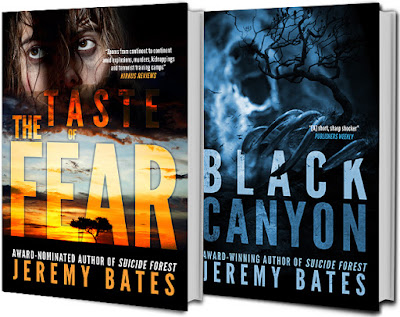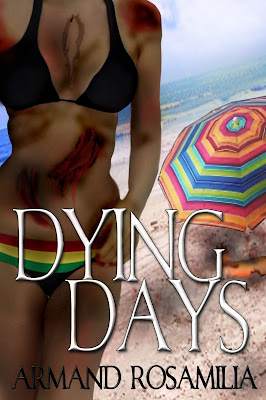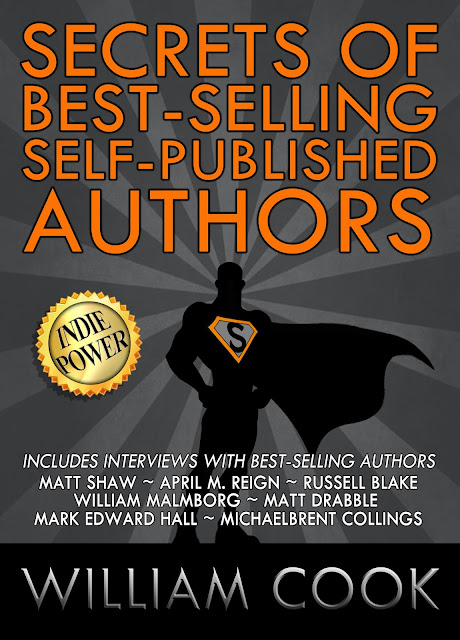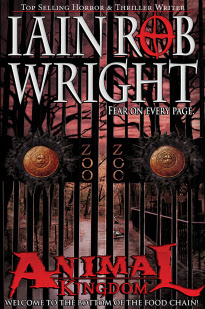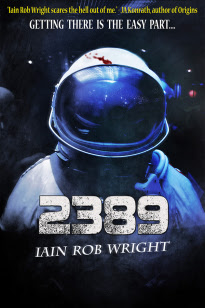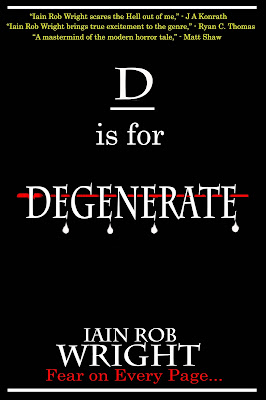Welcome to the tenth interview in the popular series, Secrets of Best-Selling Self-Published Authors.
Today's guest is award-winning author Jeremy Bates. Jeremy is a
Canadian/Australian author. His work typically explores the darker side
of human nature and the novels in his "World's
Scariest Places" series are all set in real locations, such as
Aokigahara in Japan, The Catacombs in Paris, and Helltown in Ohio. He is
also the author of the #1 Amazon bestseller White Lies, which was
nominated for the 2012 Foreword Book of the Year Award. Without further
ado, here he is, the talented Jeremy Bates:
Who are you and where do you
come from? Do you think that your life experience has gone someway towards
making you a successful author in your chosen genre?
Hey,
Will. I was born in Canada but now live in Australia. In between I’ve lived all
over the place, including Japan, Korea, the Philippines etc. And, sure, I think
my life experience has shaped me as an author. Most of my books are set all
over the world: Japan, France, Africa, and so forth. I like different places,
exotic places. Also, the characters are often from all over, whether they are
Japanese, German, British, Australian, French. Part of this is because of where
the stories are seat, but I also like using international characters because a
lot of people I’ve met, a lot of friends, are from different countries. And you
write what you know about, right? I should also mention that living in Japan
got me into the horror genre, which is what I write now. My first novel was
straight up suspense. My second was more an action thriller. I only started
writing horror because I knew about Aokigahara in Japan and thought it would
make a great setting for a story. And, given the subject matter, it sort of had
to be horror. Anyway, it kicked off the World’s Scariest Places series.
Many of your stories feature
elements and tropes from different genres. For example, thriller, horror and
travel adventure styles and themes populate most of your work – would you call yourself
a slip-stream author? What genre do you most identify your work with?
I
would call myself a horror writer, but I focus more on the story than on the
genre. Simply put, if I get a good idea for a story, I’ll probably try to write
it, regardless of genre. For example, I’ve written several novellas which I would
broadly classify as horror, but they could just as easily be dark suspense, or
psychological suspense. One even borders on sci-fi.
Where do you get your
inspiration from for your writing and for the way you brand yourself as an
author?
This
is an easy question. I get my inspiration from scary real life places. If you
do a google search on “scary places” you get pages and pages of results. As far
as branding goes, I guess I’ve just branded my books as horror set in real
locations.
Your stories are many things – adventurous, violent, terrifying – if you could pinpoint
one thing in particular that has grabbed readers of your work, what would you
say it is?
The
settings. People seem to like that they are set in real locations that they
could visit, if they so pleased.
You have enjoyed best-selling status on
Amazon – is there a particular moment in your career as an author that you
realized that you had done something right to get where you are now? Can you
pinpoint what it was that spiked your success to date?
Deciding
to self-publish. It’s been great to have complete control over everything.
Also, I’m no longer writing for my publisher, or agent, or what I think they
think will sell. I’m writing what I want to.
Your first novel was traditionally
published. Did you try to get publishing contracts for your other books early
on with traditional book publishers? If so, did you have any success there or
if not what was it that made you decide to self-publish the majority of your
work?
My
first two books were traditionally published. White Lies hit #1 overall in the
Paid Kindle Store. But this didn’t translate into a huge windfall of cash for
me because traditional publishers take a massive chunk—especially if you’re a
first-time author and have a crappy contract. Having said this, I still tried
to get Suicide Forest traditionally published. I had a great agent work on it,
and he sent it out to the Big Five and others. That was back in late 2013. But
I finally got fed up with was all the waiting. It’s a long process if your book
doesn’t get picked up right away. So by the time we decided Suicide Forest wasn’t
going to sell, it was late 2014, and I already had the next book, The Catacombs,
finished. My agent for that one—a different one at Curtis Brown—sent it out to
do the rounds. He mentioned if The Catacombs sold, the publisher would probably
want to pick up Suicide Forest too. But by then I’d already begun to think
about self-publishing Suicide Forest. The way I saw it, even if The Catacombs sold
right away, it wouldn’t be published for over a year, so I was looking at a
2016 release date. And if Suicide Forest sold as well, it wouldn’t come out
until 2017. That was sort of nuts. I’m a pretty fast writer, and I realized I
was going to have this big backlog of titles if I didn’t start self-publishing.
So I self-published Suicide Forest. And it did well, sold well, got good
reviews. This was when I gave up on traditional publishers. I realized I didn’t
need them. I got the rights back to The Catacombs, and released that. I
finished up a third book, Helltown, and put that out too. I also wrote four
novellas. So instead of having maybe two new books out by sometime in 2017, I
now have 3 novels and 4 novellas out in mid-2015. Come 2017 I’ll have a couple
more novels out on top of this, plus more novellas etc.
Once you have decided that
self-publishing might be your route, what financial and artistic considerations
should you keep in mind before you begin?
I
don’t really have any financial/artistic considerations. I do the covers and
interiors myself. I have an editor I pay, of course, but it’s not too much.
What kind of marketing did you do to
establish your author brand and what do you think is the most successful
marketing for self-published authors?
One,
I put links to my Amazon page in the back of all my Kindle books, making it
easy for readers who have just finished one book to get the next. And two, I
have one book permanently free. This is a big plus because it gets 1000 or so
downloads a day, which is a great way to build a readership and far worth the
money the book might be making if it weren’t free. Also, I offer a free novella
on my website to people who subscribe to my newsletter. I’ve gotten about 5000
subscribers this way since January who I send emails to regarding new releases
and so forth.
How important are ‘series’ books to your
success as a self-published author?
Depends
on what you write, I guess. I never used to want to write a series. Something
about using the same character over and over. I remember when I was pitching The
Catacombs, an agent who passed on it nevertheless liked the idea of the World’s
Scariest Places series, and she told me to approach her again with my next
book, and to create a really unique character to anchor the series. I didn’t
agree with this. If you write about serial killers, for example, you can have
the same detective come back for each successive book. But this wouldn’t work
for horror—at least not the horror I write. Because my main protagonist is
usually so f*** up by the end of the story, because of what he has been
through, there is no way he would ever go back to another scary place. It just wouldn’t
be plausible. So in general, it’s more difficult to create a series in horror
than other genres. Look at Stephen King, or Dean Koontz. King has the Gunslinger
series, Koontz the Odd Thomas one. But the majority of their books are
standalones. Having said all this, I did end up doing a series, but I think I
got lucky, because the series is not based on a reocurring protagonist but
rather unique, real-life settings.
Do you design your own covers? How
important do you think cover design is to a potential reader and how big a part
do you think it has played in your success to date?
As
I mentioned above, yes, I do design them. I think covers play a pretty big part
of selling books. I know I’m usually sold on a book by its cover. It’s just the
way it is.
In your opinion, is traditional
publishing on the way out? Do you think that traditional publishing can
continue to keep up with the rise of self-publishing?
Traditional
publishing is definitely on a downward trajectory. But on the way out? I don’t
think so. People still like to have a physical book. People still like to
browse bookstores in airports. People still like to spend time at the library.
However, traditional publishers definitely don’t wield the clout they used to. And
I think they have a tough road ahead, and there’s still going to be a lot of
mergers/shakeups/bankruptcies. In the end I think you’re only going to see
traditional publishers backing big name authors.
Would you ever consider signing all your
books to a traditional publishing house or will you always mange some of your
titles yourself through self-publishing?
I
don’t know if I would want to sign any books away, unless, financially, it was
really going to be worth my time. And if I did, I’d continue to self-publish.
Stephen Leather is a good example of a traditionally published author who
self-publishes. It’s allowed him to write about Thailand bar girls and quirky
horror stories and stuff that his traditional publisher wouldn’t publish.
What avenues of self-promotion
did you find to be most effective and affordable? What’s the best ‘bang-for-your-buck’
advertising you have employed?
Best
bang for my buck is definitely Bookbub. They’re a site that, for a fee, shoots
out an email blast to their massive list of subscribers when you’re running a
promotion. Depending on your genre, they can be pricey. If you’re advertising a
mystery novel at 0.99 cents you may be charged close to a grand. But their
reach is so big you’re all but guaranteed to make that back. On the other hand,
if you promote a horror title for free, it’s only one hundred fifty dollars or
something like that—but still worth the money even though you’re not going to
make any cash back because of the exposure you get. They sent out an email
blast for Suicide Forest which resulted in 20,000+ downloads in one day. The
thing is, however, they are very selective, so even if you want to pay up, they
might not take your money.
What would you say is the
single biggest advantage of deciding to self-publish?
Being
able to write what I want.
Would you recommend other
aspiring self-publishing authors pay for particular services? Editing or cover
design, for example?
Depends.
If you know how to use Photoshop, I’d recommend doing your covers yourself. I
actually have a lot of fun doing them. If you don’t know Photoshop, definitely
pay a cover designer. Also pay an editor. This goes without saying. My advice
though: cycle through different
editors until you find one you get along with and trust.
How important do you think
social media is to achieving success as a self-published author?
I
actually don’t use much social media. I used to. But I found it time consuming
and lacking. That was a couple years ago, maybe things have changed, I don’t
know. I like Goodreads, and I connect with a lot of new readers there, but not
so much on Facebook and Twitter.
Do you feel there’s a good sense of
community within the self-publishing industry? Are
you in regular contact with other self-published authors and how important was
any input you may have received early on in your career?
I
think there’s a good indie community out there. I’m speaking to you now, after
all! But I’m not in regular contact with other self-published authors. I’m
aware of those who are writing in my genre, and I keep an eye on what they’re
doing, and at some point it might be neat to do something collaborative,
whether it’s a book of short stories or whatever. But right now I’m more
focused on establishing my name, brand etc.
Where to from here? Are
you currently represented by an agent and are you working with any publishers
on future projects?
No
agents, but I might be working with foreign publishers in the future. I’ve had an
agency in Japan and a publisher in France approach me regarding the foreign
rights to my books. And this is something I would
definitely pursue. It’s the best of both worlds. I can still self-publish my
novels in English, but I can have them translated and traditionally published
in foreign languages (something I would not be able to do myself).
Can you offer any advice to fellow
writers if you could go back in time and “do it all over?” What’s your top tip
for other indie authors?
I
don’t know. Because I don’t know what I would do all over again. In a sense, I’m
sort of happy I spent so many years chasing a traditional publisher because it
made my writing better. If self-publishing was what it was today when I started
writing, I probably would have been tempted to self-publish—and that would have
been a huge mistake, because my stuff had no right seeing the light of day. It
would have gotten scathing reviews. This might have turned me off writing
altogether. So my advice to those thinking about self-publishing: make sure
your stuff is worth reading. I know that comes off as harsh, but just because you
can self-publish doesn’t mean you should.
Finally, thanks for sharing your
thoughts on self-publishing. Where is the best place for readers to find your
books?
* SPECIAL OFFER *
Make
sure you visit Jeremy's excellent website to
receive a free copy of the novel The Taste of
Fear and the novella Black Canyon, just enter your email address to join his Readers' Group. The books will be delivered
directly to your inbox. Subscribe here (or click the image above).
Check out these great titles from Jeremy Bates via Amazon.com:


